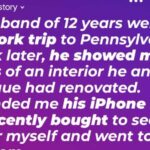It started with scraps.
I’d leave out a little rice or meat by the edge of the yard, and every morning it was gone. I figured it was raccoons or maybe one of the neighborhood cats. Then one night, I saw her—skinny, limping, but her eyes locked onto mine like she wasn’t afraid… just exhausted.
She wouldn’t come close, no matter how soft I spoke. But the next day, I saw her crawl under my porch. And I let her.
Didn’t tell the landlord. Didn’t tell my neighbor, who already complains about everything from my trash bins to the “weeds” in my yard.
A week later, I heard the sound.
Tiny, squeaky, frantic cries coming from beneath the porch steps. I dropped to my knees, and there she was—curled around two shivering pups in a patch of muddy ground, licking them clean like the world hadn’t tried to break her.
I cleared space in my shed that night, laid down blankets, made her a little den. She moved the babies herself, one by one.
I should’ve called animal control. I know that. I was already behind on rent, barely keeping my own fridge full.
But something about the way she looked at me—like she’d decided I was safe—made it impossible.
Now there’s three extra mouths to feed.
And a notice taped to my door this morning.
The note was short and cold: “Violation of lease terms. Pets not allowed. Immediate resolution required.” It wasn’t signed, but I knew it came from Mr. Peterson, the landlord. He had a reputation for being strict—some might say heartless—but he kept his properties cheap, which is why people like me could afford to live here in the first place.
I stared at the paper, then crumpled it up and shoved it into my pocket. My stomach sank as I walked back inside. The dog—I’d started calling her Luna because of the silvery-gray streaks along her fur—was curled up in the corner of the shed with her puppies nestled against her belly. They were so small, their eyes still closed, their tiny bodies rising and falling with each breath.
What was I supposed to do? Turn them out? Call someone to take them away? The thought twisted something deep inside me. I’d spent most of my life feeling invisible, overlooked, disposable. If anyone understood what it felt like to be abandoned, it was me. There was no way I could turn my back on Luna now.
That evening, I sat on the porch steps, staring out at the street. Cars passed by, headlights cutting through the dusk. I didn’t even hear him approach until I felt the shadow fall over me.
“Hey,” said Marcus, one of the few neighbors who didn’t act like I didn’t exist. He lived two doors down in a house that always seemed too quiet. “You okay?”
I shrugged, forcing a smile. “Yeah, just… thinking.”
Marcus tilted his head, studying me. He was older than me, maybe mid-thirties, with kind eyes and a scruffy beard. “You know, if you need anything—”
“I’m fine,” I interrupted quickly. Too quickly. His gaze lingered, and I shifted uncomfortably. “Really.”
He nodded slowly, but I could tell he didn’t believe me. “Alright. Well, if that changes…”
“Thanks,” I muttered, watching him walk away. Part of me wanted to call him back, to explain everything—the dog, the puppies, the eviction notice—but I couldn’t bring myself to say the words aloud. Admitting it would make it real, and I wasn’t ready for that yet.
The next morning, I woke up early and went straight to the grocery store. I bought bags of cheap dog food, bottles of water, and whatever baby formula I could find. By the time I got home, my arms were sore, and my wallet was lighter than ever. Still, seeing Luna’s tail wag when I set the food down made it worth it.
For the next few days, I focused on survival. I fed the dogs, cleaned the shed, and avoided Mr. Peterson whenever he drove by. I figured if I kept my head down long enough, maybe he’d forget about the notice. Wishful thinking, I know, but hope has a way of sneaking in when you least expect it.
Then, one afternoon, while I was sweeping the porch, I heard a knock at the door. My heart skipped a beat. When I opened it, I found an older woman standing there, clutching a casserole dish wrapped in foil.
“I’m Edith,” she said, smiling warmly. “From across the street. I saw you feeding those animals the other day. Thought you might need this.”
I blinked, surprised. “Uh… thanks. That’s really nice of you.”
Edith stepped closer, lowering her voice. “Listen, I don’t mean to pry, but I overheard Mr. Peterson talking to someone about your situation. He’s planning to evict you unless you get rid of the dog.”
My stomach dropped. “How did you—”
“He doesn’t exactly whisper when he’s mad,” she said dryly. “Look, I used to foster animals before my husband passed. If you need help, I can take the puppies once they’re weaned. Maybe even help you find homes for them.”
Her offer caught me off guard. For weeks, I’d been carrying this weight alone, convinced no one would care. Now here was this stranger, offering kindness without expecting anything in return.
“Thank you,” I whispered, tears pricking my eyes. “I’ll think about it.”
Over the next month, things began to change—not all at once, but gradually. Edith became a regular visitor, bringing food and advice. Marcus stopped by more often, helping me fix the leaky faucet and mow the lawn. Even my nosy neighbor softened after I apologized for letting the weeds grow (which turned out to be wildflowers).
As the puppies grew stronger, so did Luna. Her ribs weren’t as prominent, her coat shinier. She started following me around the yard, her tail wagging like she finally trusted me completely. Watching her play with her pups filled me with a sense of purpose I hadn’t felt in years.
One day, Edith arrived with news. “I found a family who wants to adopt the male puppy,” she said. “They have kids and a big backyard. Perfect setup.”
I hesitated, glancing at the little fluffball tumbling after his sister. Letting go wouldn’t be easy, but I reminded myself why I’d taken them in—to give them a better life.
When the day came to hand him over, I cried harder than I expected. But seeing the joy on the new owners’ faces helped ease the pain. A week later, Edith placed the female puppy with another loving family.
Luna stayed, though. She wasn’t just a stray anymore; she was part of my life. And somehow, having her around made everything else feel less overwhelming.
Months passed, and just when I thought things were settling down, Mr. Peterson showed up unannounced. My heart raced as I answered the door, bracing myself for the worst.
“I’ve had complaints,” he began, crossing his arms. “About noise. Barking.”
“She doesn’t bark,” I said quickly. “Not since the puppies left.”
He narrowed his eyes. “Still, pets aren’t allowed. You know the rules.”
Before I could respond, Luna trotted up beside me, her tail wagging cautiously. To my surprise, Mr. Peterson’s expression softened. He crouched down, holding out a hand.
“Well, aren’t you a beauty?” he murmured. Luna sniffed his fingers, then licked them. He chuckled, scratching behind her ears. “Never had a dog growing up. Always wanted one.”
Something clicked in my mind. “You know,” I said carefully, “she’s great company. Keeps me sane, honestly. Maybe… maybe she could stay?”
He stood, brushing off his pants. “We’ll see. Just keep her quiet, alright?”
As he walked away, I exhaled, realizing I’d dodged a bullet. More than that, I realized how much I’d changed since finding Luna. Before, I would’ve panicked, assumed the worst. Now, I was learning to speak up—for myself, for her.
Looking back, I realize the lesson wasn’t just about second chances or kindness. It was about connection. About how reaching out—even when it feels risky—can lead to unexpected friendships, opportunities, and growth.
If you enjoyed this story, please share it with others who might need a reminder that sometimes, the smallest acts of compassion can make the biggest difference. And don’t forget to hit that like button—it means the world to creators like me!


